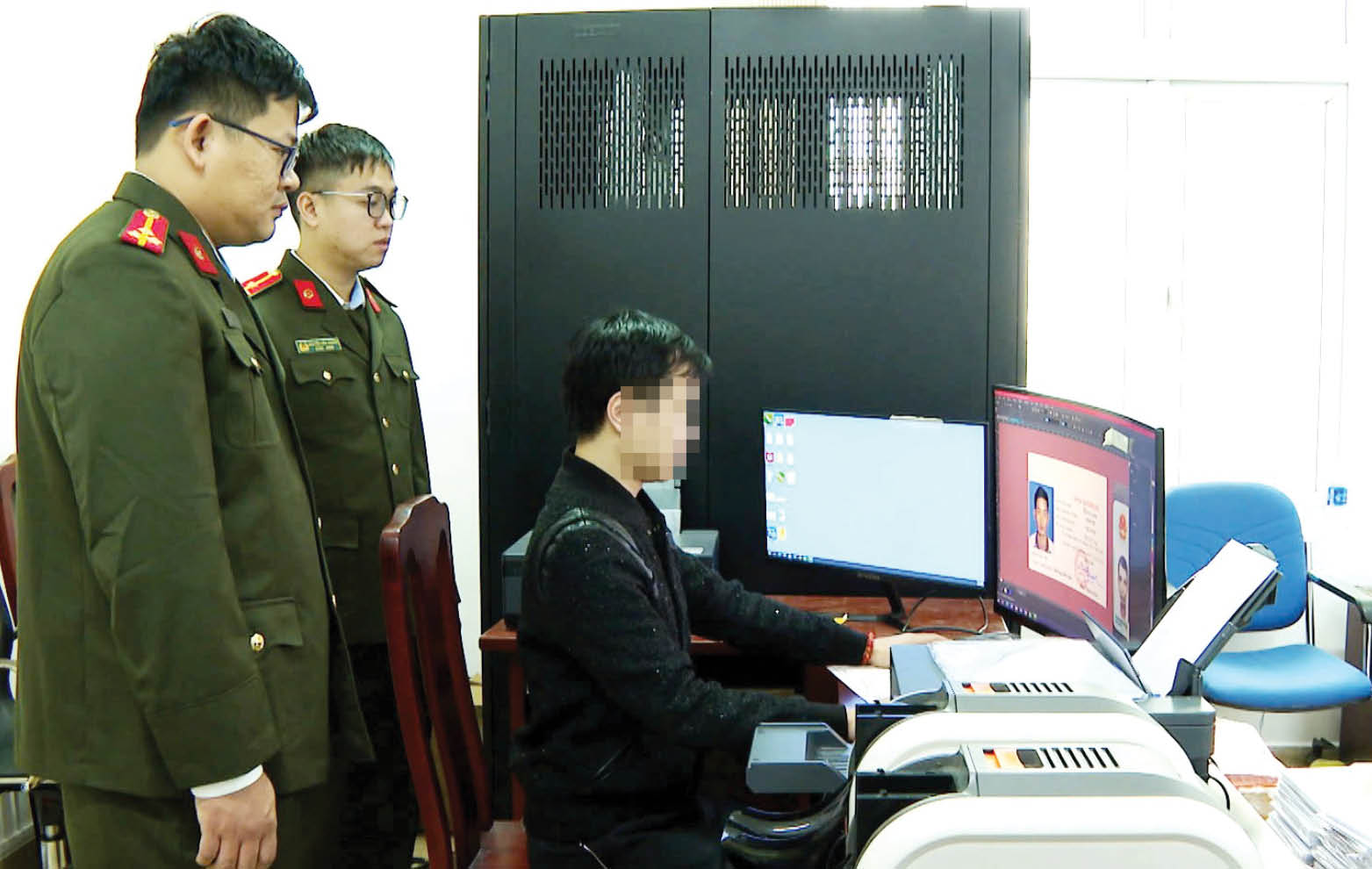 |
| Subject Pham Duy Phu recreates the method and process of producing fake documents. |
Hidden numbers from cyberspace
With the sharp expertise of the detectives of the ANM&PCTPSDCNC Department of Hue City Police, a series of seemingly harmless messages revealed unusual signs. The messages were sent in bulk via Apple's iMessage application, with the brief content: "Specializing in making driver's licenses, citizen identification cards, degrees of all kinds... reputable, confidential, nationwide delivery" and accompanied by a fake Zalo account for contact. It was not a few individual messages, but a message bombing campaign carried out with high frequency, targeting tens of thousands of random subscribers across the country.
Following the fake Zalo accounts, the detectives continued to discover a series of Facebook fanpages that were also running massive ads with similar content, with professional and eye-catching designs and interfaces to reach millions of users. All transactions and exchanges took place in a virtual world covered by countless sophisticated layers. The consultants never revealed their faces, only used fake accounts; customer information was required to be sent via Zalo and Messenger messages and payment was mainly made via cash on delivery.
Under the direct command of Major General Nguyen Thanh Tuan, Director of Hue City Police, the project was established. At the same time, the most experienced and knowledgeable officers and soldiers of the Department of Cyber Security and Crime Prevention and Control, the Department of Investigation Security of Hue City Police were mobilized, with the close coordination of the Department of Cyber Security and Crime Prevention and Control of the Ministry of Public Security and Nghe An Provincial Police. The mind-boggling battle with the "ghosts" in cyberspace officially began.
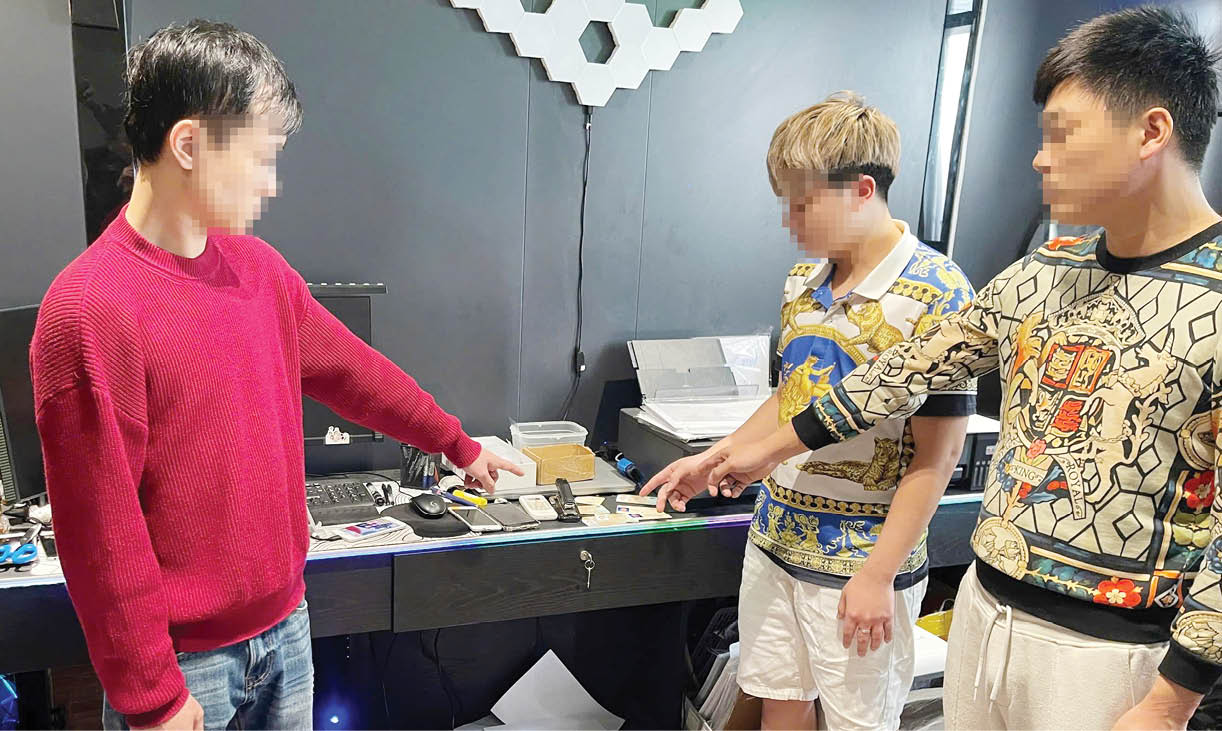 |
| Police searched the apartment where the subjects produced fake documents. |
Tracking the "boss"
The task force determined that to completely destroy this network, the most important key was to find the leader and the production "headquarters". This was no small challenge. All communication within the network was done through security applications, combined with anonymous tools. Members of the network seemed to not know each other, only working on orders from an anonymous "boss".
The most modern and synchronous professional measures were deployed. Millions of electronic data were screened and analyzed, and detectives had to persistently follow every smallest trace. An important link was revealed when the authorities focused on analyzing the fanpages running advertisements. The huge amount of money spent on advertising every day led the detectives to Pham Huu Dung (born in 1991, residing in Hanoi). Dung was the one hired to create and manage advertising campaigns on Facebook. Dung himself was just a link working online and receiving money through an account, not knowing who his real employer was.
Continuing to expand the investigation, the task force discovered a more complex technological system consisting of 3 servers rented abroad, used to operate a system of 35 smartphones operating non-stop. This system is the "machine" that spreads thousands of spam messages via iMessage every day.
Tracing the owner of this system was extremely difficult. However, with determination and high-tech measures, the detectives narrowed down the main suspect to Pham Duy Phu (born in 1992, residing in Nghe An). Although still quite young, this subject has a high level of information technology, and is knowledgeable about design and printing. All traces from the complex money flows were laundered through many virtual bank accounts to anonymous internet access addresses. Behind the layers of sophisticatedly concealed virtual curtains, the money flow eventually pointed to Phu. The portrait of the "boss" of the "huge" scale fake document crime ring gradually emerged clearly.
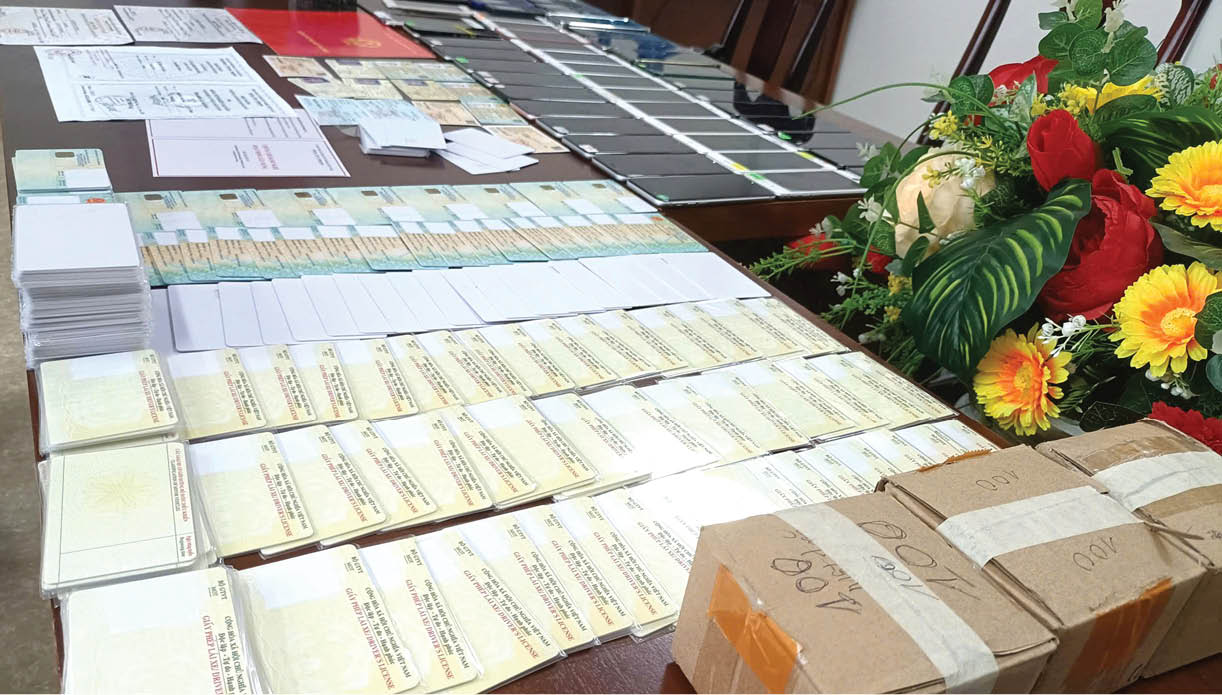 |
| Police seized many mobile phones and fake documents as evidence in the case. |
"Factory" and its network of tentacles
Having identified the ringleader Pham Duy Phu, the task force continued to "spread the net" to clarify the entire network of the subject. Phu had built a closed criminal empire with extremely strict division of tasks for members. As the mastermind, Phu not only directly operated the advertising system, managed "fake" Zalo accounts to close orders, and collected customer information, but was also the decision maker in the production stage.
Accordingly, Phu and two close associates, Tran Quoc Huy and Nguyen Phi Dinh, used a high-class, isolated apartment in Vinh City (Nghe An) to set up a "factory". Inside this apartment, there are full modern machines and equipment such as: high-tech color printers, high-end hard card printers, plastic laminators, laser engravers, embossing machines, diploma blanks, certificates, citizen identification cards, driver's licenses... ordered online. This is where fake diplomas and fake documents are produced with almost real sophistication.
To avoid being exposed, Phu used fake Facebook and Telegram accounts to post job postings for domestic helpers and office workers nationwide. Recruited people would be assigned different tasks without knowing that they were assisting criminals. They were asked to open bank accounts, receive and transfer money or perform other simple tasks; forming a "money laundering" network and supporting Phu.
After production, the fake documents were collected and transferred to a contact in Hanoi led by Nguyen Huy Tien and Dinh Xuan Nam, who were in charge of transferring the fake documents before delivering them to customers in order to mislead the authorities. More sophisticatedly, Tien and Nam did not send the goods from a fixed post office but divided the packages into small packages and distributed them to many different post offices of ViettelPost and VNPost throughout the city. Another subject, Mai Quoc Viet (residing in Hanoi), was assigned the task of creating the bill of lading code, tracking the order's journey and handling any problems that arose. This process created a "maze" in the transportation stage, making tracing extremely difficult.
Since operating in 2022, Phu's network has illegally profited more than 4 billion VND, causing a great danger to social order.
"Lifting the net" and a warning
After a long time of patiently collecting all the documents and evidence, the investigation team decided that the time was ripe to "take the net". A detailed and meticulous plan was drawn up. Many working groups were established and simultaneously moved to locations in Nghe An and Hanoi.
In one day, reconnaissance teams simultaneously raided Phu's "headquarters" in Vinh City and the residences of key members of the network in Hanoi City. Pham Duy Phu and his accomplices were arrested in surprise. Evidence seized on the spot included 35 smartphones, 4 desktop computers, 1 laptop, 2 thermal ID card printers, 3 color printers, along with more than 15,000 fake forms of various types and many types of fake documents that had been produced.
At the investigation agency, faced with undeniable evidence, Pham Duy Phu and the subjects had to bow their heads and admit all their crimes. The Security Investigation Agency of Hue City Police issued a decision to prosecute 8 defendants including: Pham Duy Phu, Nguyen Huy Tien (born in 1979, residing in Hanoi), Nguyen Phi Dinh (born in 1997, residing in Nghe An), Pham Dac Hoa (born in 1983, residing in Hue City), Tran Quoc Huy (born in 1994, residing in Nghe An), Pham Huu Dung (born in 1991, residing in Hanoi), Dinh Xuan Nam (born in 2000, residing in Ninh Binh) and Mai Quoc Viet (born in 2000, residing in Nam Dinh) for the crime of "Forgery of seals and documents of agencies and organizations; crime of using fake seals or documents of agencies and organizations" as prescribed in Article 341 of the Penal Code.
The successful destruction of the case is an outstanding achievement of the Hue City Police force, demonstrating the spirit of resolute and uncompromising fight against crime, especially high-tech crime. The case is also a strong warning to those who intend to take advantage of technology to commit illegal acts and those who, for immediate benefits, assist and use fake documents.
The act of forging and using fake documents is not only a violation of the law but also causes unpredictable consequences, undermines social trust, seriously affects security and order and is the seed of many other dangerous crimes.
Source: https://huengaynay.vn/chinh-tri-xa-hoi/phap-luat-cuoc-song/boc-go-duong-day-lam-giay-to-gia-do-ong-trum-9x-cam-dau-157907.html


![[Photo] The 4th meeting of the Inter-Parliamentary Cooperation Committee between the National Assembly of Vietnam and the State Duma of Russia](https://vphoto.vietnam.vn/thumb/1200x675/vietnam/resource/IMAGE/2025/9/28/9f9e84a38675449aa9c08b391e153183)

![[Photo] Prime Minister Pham Minh Chinh meets with Chairman of the State Duma of the Russian Federation Vyacheslav Volodin](https://vphoto.vietnam.vn/thumb/1200x675/vietnam/resource/IMAGE/2025/9/29/08ca17cb0c46432dbdb94f9eaf73b47a)
![[Photo] President Luong Cuong receives Chairman of the State Duma of the Russian Federation Vyacheslav Volodin](https://vphoto.vietnam.vn/thumb/1200x675/vietnam/resource/IMAGE/2025/9/29/6bd456e072504df3a468acbf9b7989c8)
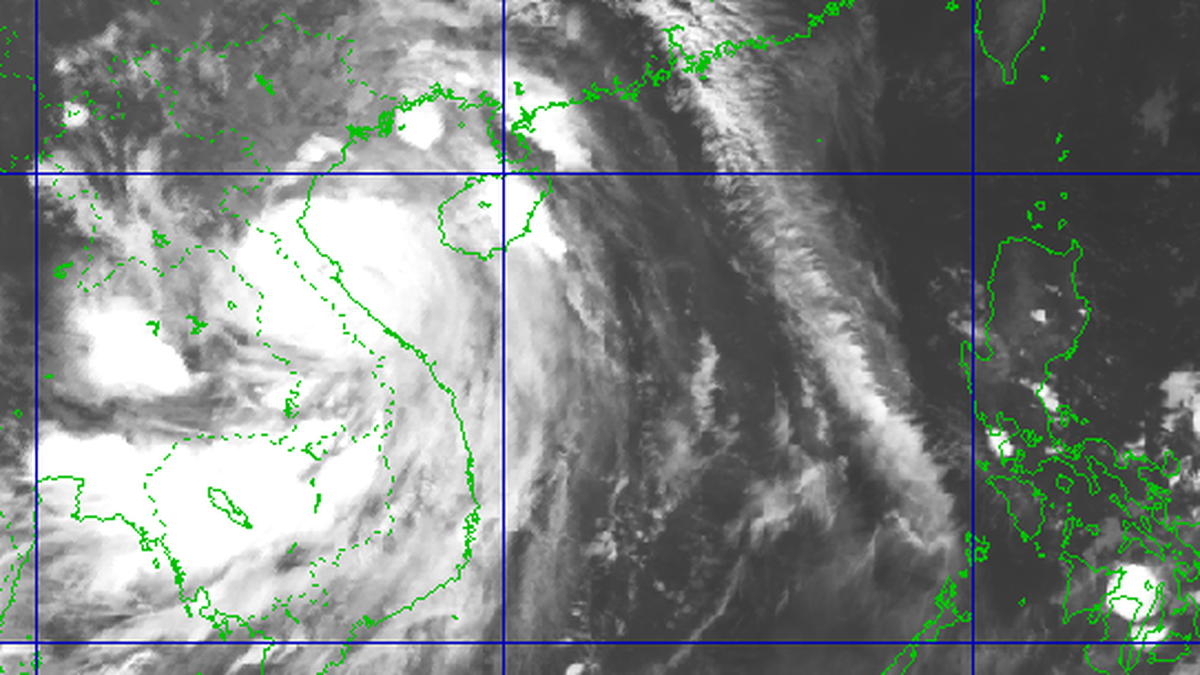
![[Photo] Joy on the new Phong Chau bridge](https://vphoto.vietnam.vn/thumb/1200x675/vietnam/resource/IMAGE/2025/9/28/b00322b29c8043fbb8b6844fdd6c78ea)



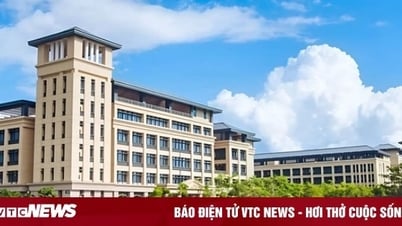

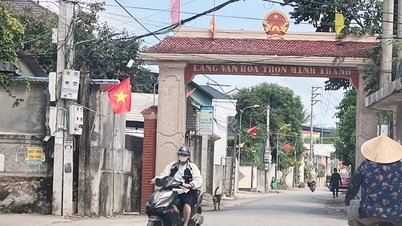

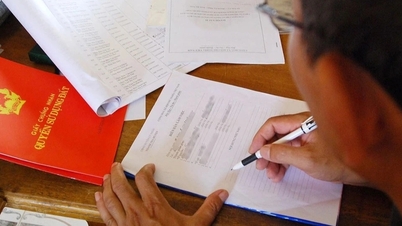

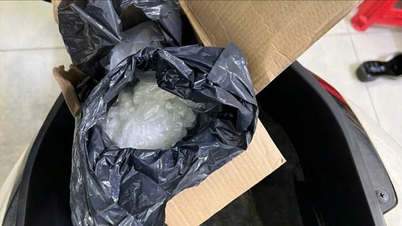



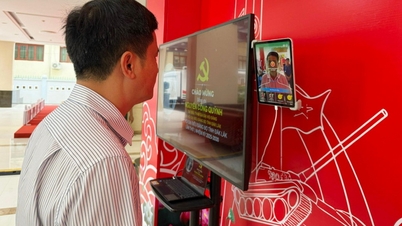


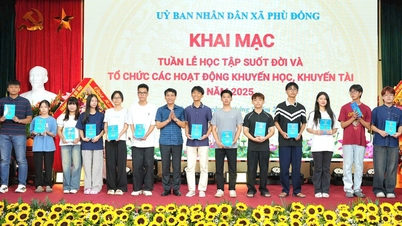
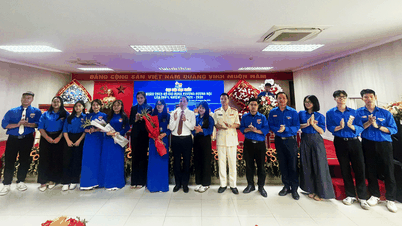
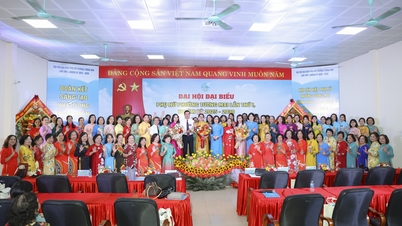






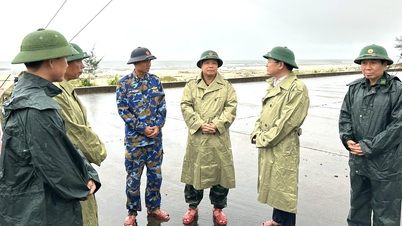



![[Photo] General Secretary To Lam receives Chairman of the State Duma of the Russian Federation Vyacheslav Volodin](https://vphoto.vietnam.vn/thumb/1200x675/vietnam/resource/IMAGE/2025/9/29/3814a68959e848f586178624b6bd66e5)




















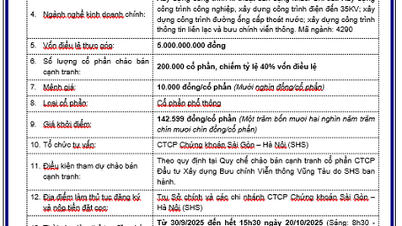
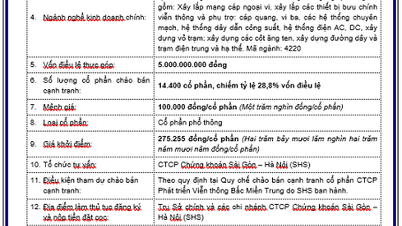

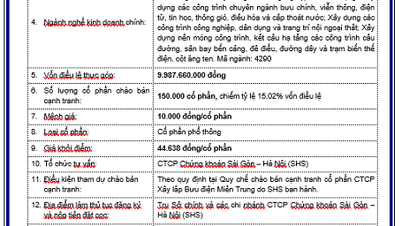


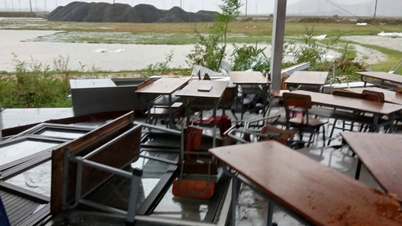

![[Photo] President Luong Cuong receives Chairman of the State Duma of the Russian Federation Vyacheslav Volodin](https://vphoto.vietnam.vn/thumb/402x226/vietnam/resource/IMAGE/2025/9/29/6bd456e072504df3a468acbf9b7989c8)

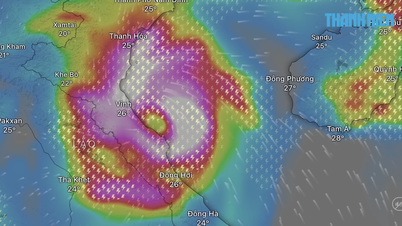


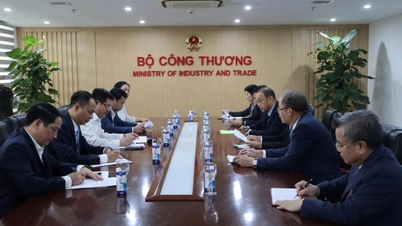

























Comment (0)